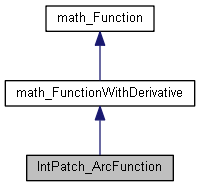#include <IntPatch_ArcFunction.hxx>
|
| | IntPatch_ArcFunction () |
| |
| void | SetQuadric (const IntSurf_Quadric &Q) |
| |
| void | Set (const Handle< Adaptor2d_HCurve2d > &A) |
| |
| void | Set (const Handle< Adaptor3d_HSurface > &S) |
| |
| Standard_Boolean | Value (const Standard_Real X, Standard_Real &F) override |
| | Computes the value <F>of the function for the variable <X>. Returns True if the calculation were successfully done, False otherwise. More...
|
| |
| Standard_Boolean | Derivative (const Standard_Real X, Standard_Real &D) override |
| | Computes the derivative <D> of the function for the variable <X>. Returns True if the calculation were successfully done, False otherwise. More...
|
| |
| Standard_Boolean | Values (const Standard_Real X, Standard_Real &F, Standard_Real &D) override |
| | Computes the value <F> and the derivative <D> of the function for the variable <X>. Returns True if the calculation were successfully done, False otherwise. More...
|
| |
| Standard_Integer | NbSamples () const |
| |
| virtual Standard_Integer | GetStateNumber () override |
| | returns the state of the function corresponding to the latest call of any methods associated with the function. This function is called by each of the algorithms described later which defined the function Integer Algorithm::StateNumber(). The algorithm has the responsibility to call this function when it has found a solution (i.e. a root or a minimum) and has to maintain the association between the solution found and this StateNumber. Byu default, this method returns 0 (which means for the algorithm: no state has been saved). It is the responsibility of the programmer to decide if he needs to save the current state of the function and to return an Integer that allows retrieval of the state. More...
|
| |
| const gp_Pnt & | Valpoint (const Standard_Integer Index) const |
| |
| const IntSurf_Quadric & | Quadric () const |
| |
| const Handle< Adaptor2d_HCurve2d > & | Arc () const |
| |
| const Handle< Adaptor3d_HSurface > & | Surface () const |
| |
| const gp_Pnt & | LastComputedPoint () const |
| | Returns the point, which has been computed while the last calling Value() method. More...
|
| |
| virtual | ~math_FunctionWithDerivative () |
| |
| virtual | ~math_Function () |
| | Virtual destructor, for safe inheritance. More...
|
| |
◆ IntPatch_ArcFunction()
| IntPatch_ArcFunction::IntPatch_ArcFunction |
( |
| ) |
|
◆ Arc()
◆ Derivative()
Computes the derivative <D> of the function for the variable <X>. Returns True if the calculation were successfully done, False otherwise.
Implements math_FunctionWithDerivative.
◆ GetStateNumber()
returns the state of the function corresponding to the latest call of any methods associated with the function. This function is called by each of the algorithms described later which defined the function Integer Algorithm::StateNumber(). The algorithm has the responsibility to call this function when it has found a solution (i.e. a root or a minimum) and has to maintain the association between the solution found and this StateNumber. Byu default, this method returns 0 (which means for the algorithm: no state has been saved). It is the responsibility of the programmer to decide if he needs to save the current state of the function and to return an Integer that allows retrieval of the state.
Reimplemented from math_Function.
◆ LastComputedPoint()
| const gp_Pnt& IntPatch_ArcFunction::LastComputedPoint |
( |
| ) |
const |
Returns the point, which has been computed while the last calling Value() method.
◆ NbSamples()
◆ Quadric()
◆ Set() [1/2]
◆ Set() [2/2]
◆ SetQuadric()
◆ Surface()
◆ Valpoint()
◆ Value()
Computes the value <F>of the function for the variable <X>. Returns True if the calculation were successfully done, False otherwise.
Implements math_FunctionWithDerivative.
◆ Values()
Computes the value <F> and the derivative <D> of the function for the variable <X>. Returns True if the calculation were successfully done, False otherwise.
Implements math_FunctionWithDerivative.
The documentation for this class was generated from the following file:

 Public Member Functions inherited from math_FunctionWithDerivative
Public Member Functions inherited from math_FunctionWithDerivative Public Member Functions inherited from math_Function
Public Member Functions inherited from math_Function 1.8.13
1.8.13